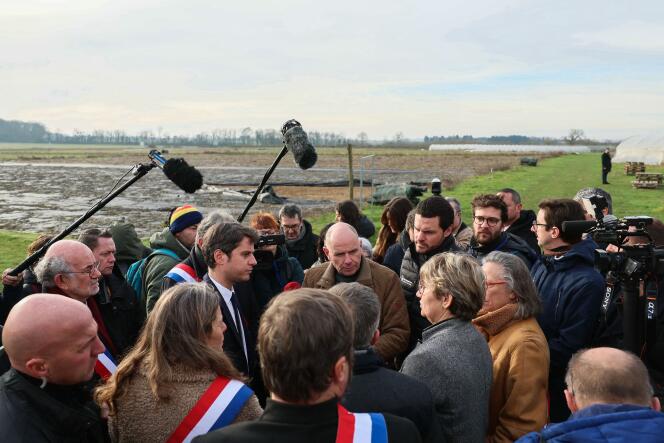


Two days after a trip to southwestern France, where he announced an initial series of measures in response to farmers' anger, Prime Minister Gabriel Attal set off again to meet them on Sunday, January 28, at a farm near the city of Tours. "If you hadn't come, I think the area would have been on fire this morning," Frédérique Alexandre, president of the local branch of the FNSEA farmers' union, told him. "It's good that I'm here, then," smiled Attal. "I don't know if that should make you smile," retorted the union leader, seeing it as a sign of vanity.
"You know, I'm presenting my government policy statement on Tuesday," Attal had to explain, taken aback. "My advisers, all those in gray suits behind me, were telling me to stay in Paris to prepare it. I was smiling because I decided not to follow the advice I was being given and to go out into the field."
"Even if it's difficult, even if I get yelled at, I don't want the flow of dialogue to break," he clarified later. Alongside him, local MP Daniel Labaronne of President Emmanuel Macron's Renaissance party saw the exchange as "a moment of truth."
A week after the start of the crisis, and with the FNSEA predicting a "week of danger," Attal played the humility card. On Sunday, he admitted that he had "not responded" to "everything that constitutes the malaise and unhappiness of our farmers," despite the 10 promises he made on Friday. These initial measures were "just the beginning," he said, pledging to "continue day after day, week after week, to make progress."
"I want us to clarify things and see what additional measures we can take to deal with this unfair competition," said Attal. These will be announced "probably as early as Tuesday," said Agriculture Minister Marc Fesneau, speaking on the BFM-TV television channel on Sunday, adding, "We need measures that will give credibility to the government's word."
"Even in a one-hour speech, the government would not able to respond" to all the sectors and all the regions, observed Frédéric Descrozaille, Renaissance MP and former president of the Young Farmers union, noting that it was the first time there was "such a multitude of demands, often hyper-local."
Silent since the start of the crisis, leaving his prime minister in the firing line, Macron could enter the fray on Thursday, at a summit of the European Council. With Brussels refusing to extend the exemption in 2024 allowing set-aside land to be cultivated, the French president "will be pulling out all the stops" to turn things around, Fesneau told the broadcaster Franceinfo on Saturday. On the issue of unfair competition, too, the power is held in Brussels.
You have 50% of this article left to read. The rest is for subscribers only.
